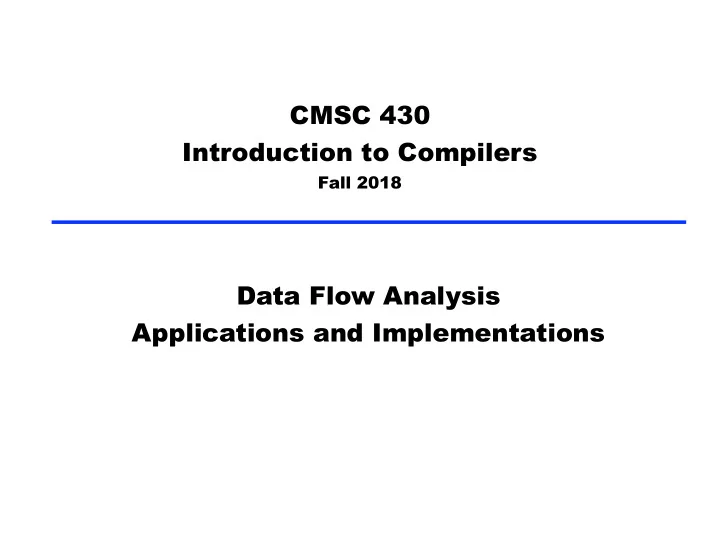

CMSC 430 Introduction to Compilers Fall 2018 Data Flow Analysis Applications and Implementations
Data Flow Analysis • A framework for proving facts about programs • Reasons about lots of little facts • Little or no interaction between facts ■ Works best on properties about how program computes • Based on all paths through program ■ Including infeasible paths • Operates on control-flow graphs, typically 2
Space of Data Flow Analyses May Must Reaching Available Forward definitions expressions Live Very busy Backward variables expressions • Most data flow analyses can be classified this way ■ A few don’t fit: bidirectional analysis • Lots of literature on data flow analysis 3
Applications: Reaching Defs. • Constant propagation : if all definitions of a given variable’s use are the same constant value, just assign the constant directly. • Loop invariant code motion : if an expression is computed in a loop, but all of the components are defined outside the loop, the code can move. 4
Applications: Liveness • Register allocation : variables that are not live in a given basic block (or subgraph) do not need to be in registers. More on this later. • Dead code elimination : variables that are assigned but not live after the assignment don’t need to be computed at all. 5
Applications: Available Exprs. • Common sub-expression elimination: create a new variable containing the result of an expression. Replace subsequent uses of the expression with a read from the variable. 6
Applications: Very Busy Exprs. • Code motion , e.g., move the computation of an expression to before a loop or branch. • If the same expression will be computed on every branch of a conditional, or every time through the loop, it can be pre-computed. t = a - b if (a < b) { if (a < b) { x = a - b x = t } else { } else { y = a - b y = t } } 7
Implementations • Optimizing compilers implement data-flow analysis • GCC: https://www.airs.com/dnovillo/200711-GCC-Internals/200711-GCC- ■ Internals-4-cfg-cg-df.pdf https://github.com/gcc-mirror/gcc/blob/master/gcc/df-core.c ■ https://github.com/gcc-mirror/gcc/blob/master/gcc/df-problems.c ■ • Clang: https://clang.llvm.org/doxygen/LiveVariables_8cpp_source.html ■ https://github.com/llvm-mirror/clang/blob/master/lib/Analysis/LiveVariables.cpp ■ https://github.com/llvm-mirror/clang/blob/master/lib/Analysis/UninitializedValues.cpp ■ 8
Implementations (cont.) • Static analysis and bug-finding tools also use DFA • Haskell package for LLVM: http://hackage.haskell.org/package/llvm- analysis-0.3.0/docs/LLVM-Analysis-Dataflow.html • C Intermediate Language (CIL) ■ https://github.com/cil-project/cil http://cil-project.github.io/cil/doc/html/cil/ ■ Written in OCaml! ■ Stable but no longer directly maintained ■ Used in Frama-C: http://frama-c.com/ 9
Using CIL on Grace $ ssh grace.umd.edu $ source /afs/glue.umd.edu/class/fall2018/cmsc/430/0201/public/.opam/opam-init/init.csh $ git clone https://github.com/cil-project/cil $ cd cil $ ./configure && make $ ./bin/cilly —help | less $ ./bin/cilly \ —-save-temps \ —-doLiveness \ --live_func=main \ -—live_debug \ /afs/glue.umd.edu/class/fall2018/cmsc/430/0201/public/src/ex1/ex1.c 10
ex1.c int main(int argc, char *argv[]) { int x, y, z, w, a; x = 10; w = 20; a = 100; y = x + 3; z = y + w; w = 42; while (z < a) { z = z + y; a = a - 1; x = x + 1; if (z > 5) { y = x + 3; } } return x; } 11
main() CFG 1 x = 10 w = 20 1: 2: x(int ),y(int ),z(int ),a(int ), a = 100 3: x(int ),y(int ),z(int ),a(int ), y = x + 3 4: x(int ), 5: x(int ),y(int ),z(int ),a(int ), z = y + w 6: x(int ),y(int ),z(int ),a(int ), w = 42 7: x(int ),z(int ),a(int ), 8: x(int ), 2 loop 3 z < a z = z + y 4 5 break a = a - 1 x = x + 1 6 8 z > 5 return x 7 y = x + 3 12
Recommend
More recommend